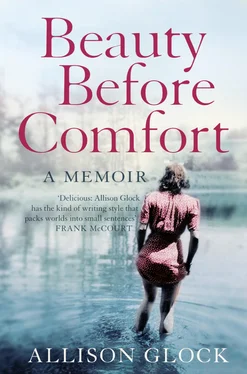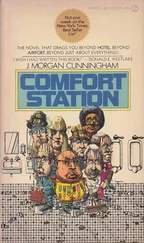This routine did not change for sixty years. The shades and the products stayed the same, and when fads like contouring and brow thickening happened along, my grandmother was not tempted. As a child in West Virginia, I watched my grandmother do her face almost every morning. I sat on the floor, silent, while she executed the same movements, brushed the same strokes, never skipping a day, never rushing through it, never, ever smudging lipstick on her teeth. To Grandmother, a woman who didn’t bother to make the most of what God gave her was displaying a lack of fortitude. As far as she could tell, the only women who didn’t make themselves up were lesbians and lunatics, and while she had nothing against either group, she certainly strove to differentiate herself.
“Beauty before comfort,” she would say as she trimmed her brows and cinched her belts corset-tight. My grandmother is so beautiful that she has never once been comfortable, a cross she bears with the subtlety of Liberace. Even now, at the age of eighty-one, she has her hair colored weekly and doesn’t descend the stairs without full makeup. If an opera spontaneously broke out at her nursing home, Grandmother would be appropriately dressed.
It is a legacy she has passed down to her own daughters, and they to theirs. Generations of women painting themselves to perfection, ramming their feet into tiny shoes, sucking in their bellies, dousing their hair with enough spray to gag a horse, girl after girl learning the value of being “as pretty as you can be.”
As family legacies go, beauty before comfort is a particularly cumbersome inheritance. For my mother, it necessitates a minimum full hour of prep time every morning, time that lengthens as she grows older. For my youngest sister, it requires an arsenal of beauty products—enough to fill a second suitcase when she travels. For me, it meant coming to terms with the fact that in a long line of great beauties, I was not a great beauty, and that I’d better start honing my sense of humor.
For all of us, it means living with a low-grade anxiety, a murmur in our brains fueled by our collective self-consciousness and our compulsive sizing up of our place in any room—Who’s prettier? Who am I prettier than?—as if our very survival depends on our ability to seduce.
For Grandmother, the pursuit of beauty meant something deeper. Born as she was in a factory town, tiny and blinkered and perched precariously on the banks of the Ohio River, beauty meant nothing less than freedom. Ugly girls didn’t escape to Hollywood and sit by the pool in leather mules. Ugly girls didn’t marry up and fly away on airplanes. Ugly girls got left behind and never knew any better.
Grandmother believed that there are people who tell stories and people who inspire the telling, and she intended to be the latter. “A pig’s ass is pork,” she would say when the local men pecked after her, wanting to know her heart’s intentions. Or maybe, “It ain’t lying if it’s true.” When the boys would confess their desires, daisies in trembling hand, Grandmother would smile and weave the flowers into a halo for her hair. Before it was all over, she would have seven marriage proposals and a body like Miss America and her share of the tragedies that befall small-town girls with bushels of suitors and bodies like Miss America, girls who dare to see past the dusty perimeters of their lives.
She keeps a memory book from this time, her youth, before she was tired and widowed and old, when she was cream-fresh and believed her life was as open as the road. All women kept scrapbooks back then, hoping somehow that their history would mean more than most. My grandmother’s is a three-ring brown plastic binder with black construction-paper pages holed out at the edges and snapped inside. The pages have worn through the years and many have Scotch tape bonded to the seams. In the book are newspaper clippings and birth announcements, ticket stubs and good-natured platitudes cribbed from local papers, bromides along the lines of “Though you have but little or a lot to give, all that God considers is how you live.” (I can only figure she found these snippets ironic, as my grandmother has never shown the least bit of interest in God or any of his considerations.)
For the most part, there are photographs. Black-and-white images of her and her boyfriends, sitting on cars, standing on fences, the men smoking cigarettes in World War II uniforms, Grandmother fanning out her dresses to best advantage. On many of the shots of the men, there are love notes penned in the corners, hungry scrawlings declaring their affection for the girl behind the camera.
There must be more than one hundred of these pictures, I know because Grandmother and I have often looked at them. Every Christmas or Fourth of July, out comes the memory book and the stories.
“Now, that boy sent me a big bottle of Chanel Number Five from boot camp, I saved the bottle. And that boy took me to the Kentucky Derby; I had a mint julep. And that boy raised greenhouse roses. And that boy took me roller-skating. And that boy died in the war.”
She tells me which boys she loved and which loved her. She tells me about her brothers and her sister and her mother and father. She tells me about her house and what went on there and how it was to be young in West Virginia, to be a skinny, eager child with disobedient hair and bottomless longing. Certain pictures are like songs, making her cry no matter how many times she sees them. Almost every snapshot is labeled neatly with the subject’s name—including each photograph of my grandmother: “Aneita Jean Blair” tightly jotted in the white border at the top, a nod to the future she dreamed she’d have, one where strangers knowing who she was would matter.
The state of West Virginia was born in conflict and has retained lo these many years a mulish attitude problem. The people born there are chippy. It’s a birthright.
The state came to be in an act of war, when the western half of the state broke off from its eastern parent, Virginia, in 1863. The two sides disliked each other with familial intensity. The western half envied the wealthy eastern half. The eastern half was ashamed of the western half. The westerners saw the easterners as idle slave owners. The easterners saw the westerners as boorish rednecks.
“What real share insofar as the mind is concerned could the peasantry of the west be supposed to take in the affairs of the state?” said easterner senator Benjamin Watkins Leigh on the floor of the 1829 Virginia legislature.
“Screw you,” said the peasantry of the west.
Western Virginians were sick of the ridicule, of being overlooked when it came to building schools, of being dismissed as “woolcaps” by the richies who lived in the pampered south of the state. Then, around 1850, the state of Virginia borrowed $50 million for improvements and the construction of roads, canals, and railways. The only money spent in what would become West Virginia was $25,000to build the “Lunatic Asylum West of the Allegheny.”
It was not a promising precedent, and the two regions formally went at each other’s throats. The rivalry played out in the legislature for years, until finally President Lincoln stepped in and pressured Congress to push Western Virginia’s independence through. This decision “turns so much slave soil to free,” he said. It was “a certain and irrevocable encroachment upon the cause of the rebellion.”
Thus was born a state and the lasting tradition among its people of giving whomever they please the finger. “Mountaineers are always free,” declares the state motto. This history was not lost on my grandmother.
Aneita Jean Blair was born at the foot of her mother’s bed on September 30, 1920.
Читать дальше












